Marys Seacole
Mosaic Theater
Jordan Wright
May 10, 2022
Special to The Zebra
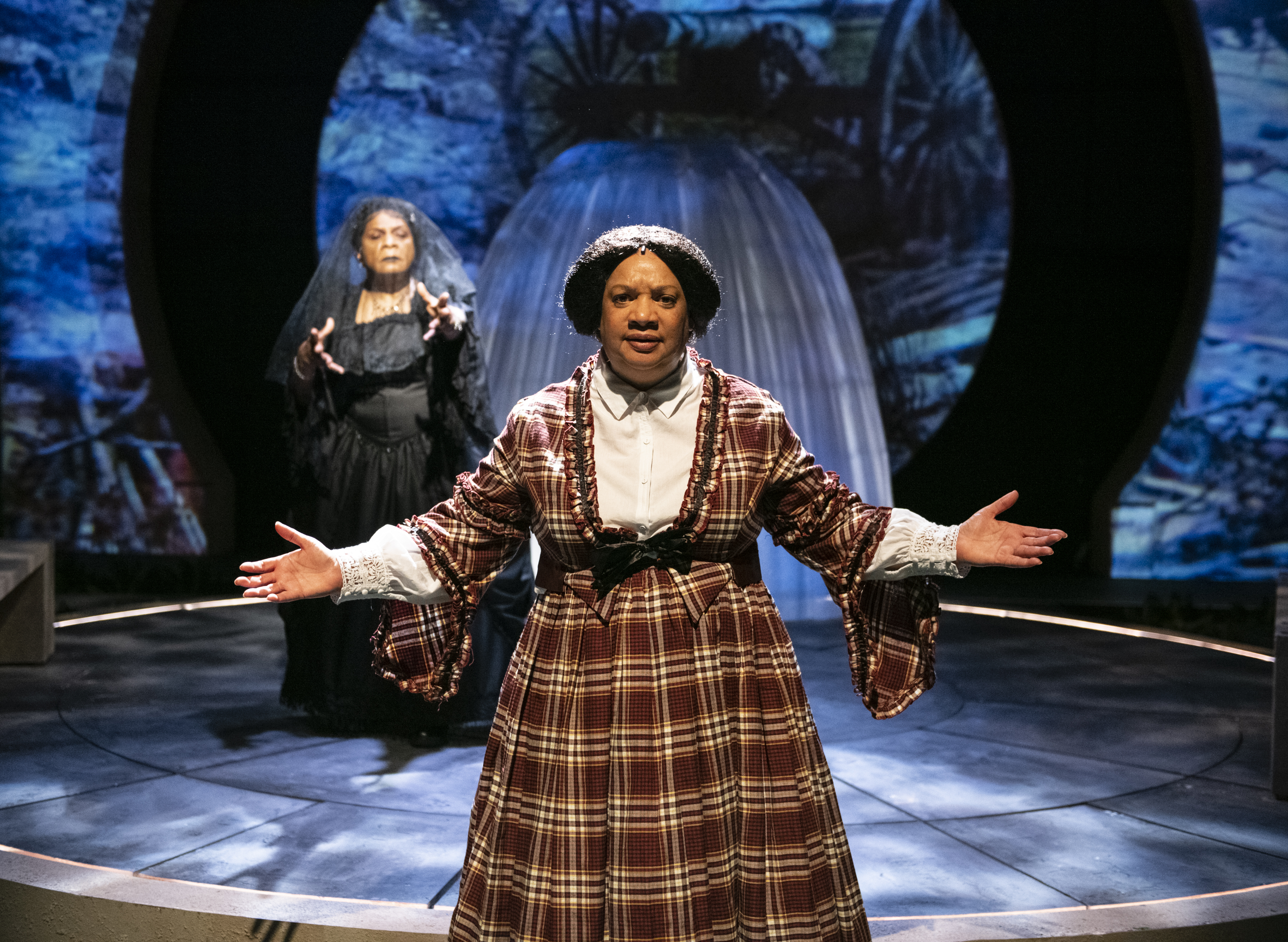 Tina Fabrique as Duppy Mary and Kim Bey as Mary (Photo/Margot Schulman) Born in Jamaica to a Scottish seafaring father and Jamaican mother, Mary considered herself Creole but above all a daughter and defender of the British Empire. From a tradition of Jamaican nurses and caregivers, she was inspired by her mother a practitioner in the ancient healing arts of the Caribbean. Not commonly known is the extraordinary legacy of this Black female pioneer in the field of medicine. In a spellbinding tale, Pulitzer Prize and Obie-winning playwright Jackie Sibblies Drury has cast a fierce eye on Seacole’s evolution as an inspirational figure in the history of Jamaican nurses and their struggle to be accepted in an age when racism was normative.
As the central character, Mary opens by delivering her narrative center stage. Played by Kim Bey in a tour de force performance, Mary is joined by a revolving group of representational female figures whose personal stories – some contemporary, some from the past – dovetail seamlessly into the tale Drury weaves. These women sometimes appear as muses, sometimes they present like The Furies, but they are wholly crafted to be believable. It is an important story that Drury draws from, one that we have been deprived of for far too long.
Born in 19th century Jamaica during a plague, Mary studied nursing. Driven by a strong entrepreneurial spirit and a keen sense of adventure, young Mary “yearned for medical knowledge” and traveled to Crimea during the war to minister to the sick and dying as a tropical disease specialist. She was rebuffed initially, by Florence Nightingale herself, yet her ambition has her opening a hotel for White elites who stuck up their noses at her yet found they could not live without her kind and knowledgeable ministrations. As grim as those scenes of war are represented here, Drury finds a way to insert plenty of comedic relief. Especially hilarious is a scene wherein Mary offers shots of rum to the patrons of her fancy hotel claiming it will keep the cholera away. Drunkenness ensues.
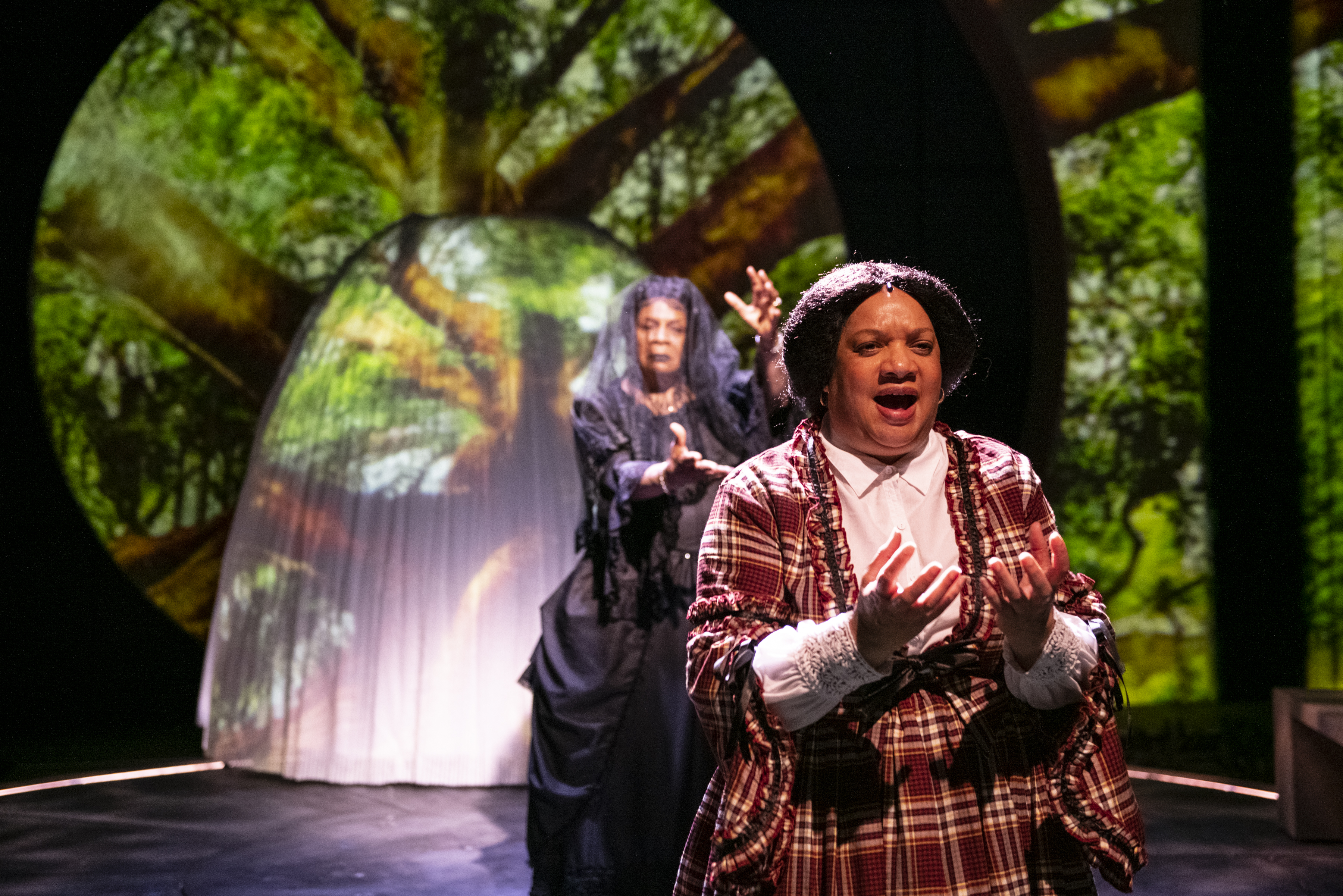 Tina Fabrique as Duppy Mary and Kim Bey as Mary Mary’s mother (Tina Fabrique) appears frequently as a phantom in elaborate Victorian dress urging Mary to respect the dark arts of traditional Jamaican healing. She is a specter from Mary’s past, a woman who abused Mary yet inspired her too. Other actors play a dizzying array of roles – each cleverly crafted and brilliantly performed. Mary’s daughter (Amanda Morris Hunt) also appears speaking in strong Jamaican patois, her performance is whip-smart. Another stellar performance is by Megan Graves playing a rebellious daughter anxiously awaiting her mother’s demise. In a later incarnation she plays a patient who throws herself on Mary’s not inconsiderable mercy. Drury is brilliant at creating multi-dimensional characters she imbues with both fire and ice.
Several dialects taught by Teisha Duncan and Jen Rabbitt Ring – from Irish and Scottish to Jamaican and British – are all quite effective in setting the mood for a production so cleverly devised, featuring a raised circular stage, a series of evocative video projections by Mona Kasra and enhanced with dramatic lighting by John D. Alexander.
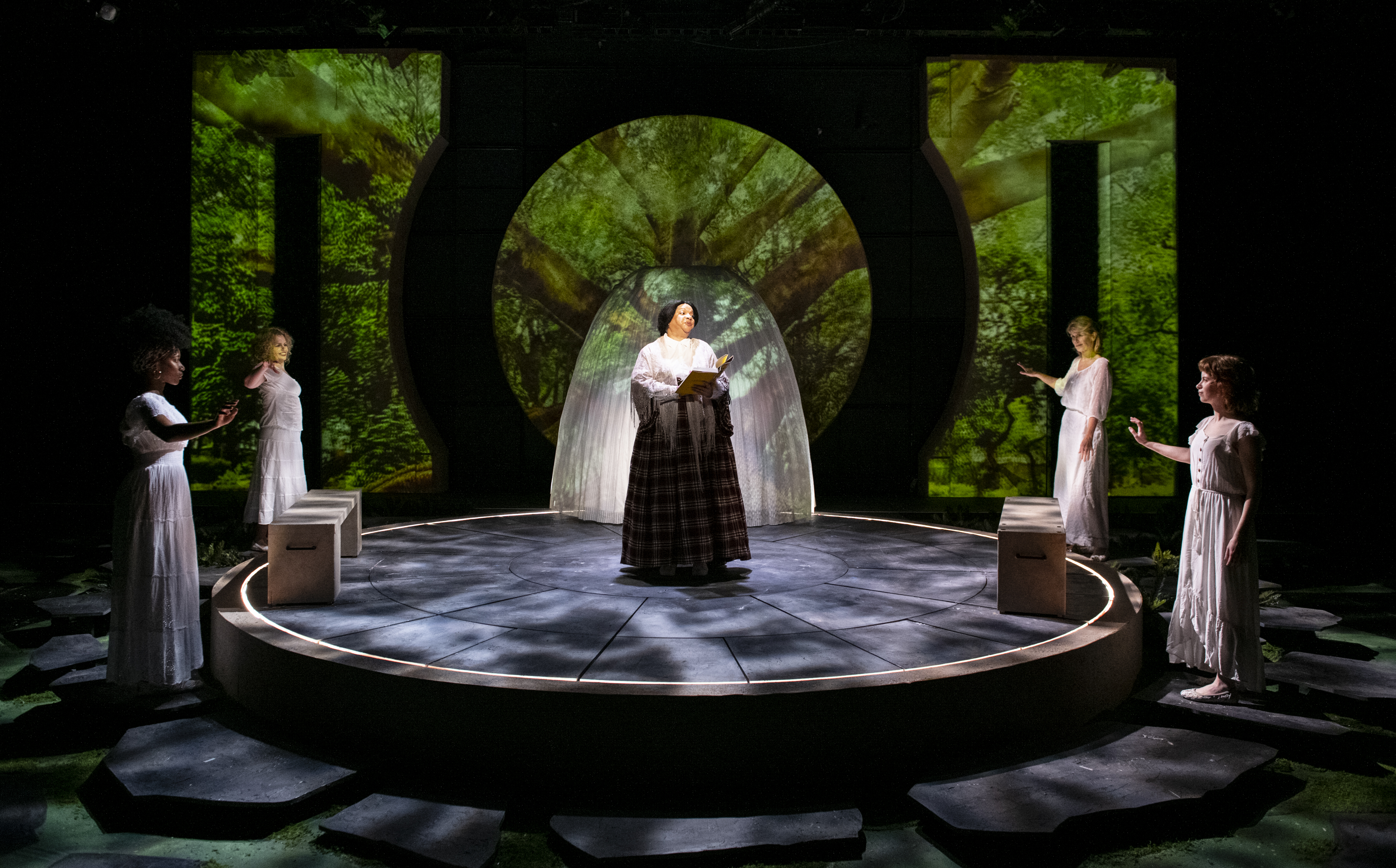 Amanda Morris Hunt, Tonya Beckman, Kim Bey, Claire
Schoonover, Megan Graves (Photo/Margot/Schulman) In this haunting and compelling drama, Drury has gifted us with powerfully relatable and deeply vulnerable characters. Speaking on the importance of healthcare workers, Mosaic’s Managing Director Serge Seiden said, “It became more urgent for us to present this play because of COVID.”
Highly recommended.
Imaginatively directed by Eric Ruffin, it includes terrific performances by Tonya Beckman as May; Tina Fabrique as Duppy Mary; Megan Graves as Miriam; Amanda Morris Hunt as Mamie; and Claire Schoonover as Merry.
Scenic Design by Emily Lotz; Costume and Wig Design by Moyenda Kulemeka; Sound Design by Cresent Haynes; Dramaturg Teisha Duncan.
Through May 29th at The Atlas Performing Arts Center 1333 H Street, NE, Washington, DC 20002. For tickets and information visit www.MosaicTheater.org or call the box office at 202 399-7993 from Monday – Friday 11am – 5pm. For COVID protocols visit the website. For further study read the autobiographical “Wonderful Adventures of Mrs. Seacole in Many Lands”.
Jordan Wright
February 4, 2020
Waitress Sheri doesn’t seem like the perfect match for a Muslim cab driver from Egypt. She’s a free-spirited Caucasian with a potty mouth and a string of lovers who dumped her, and he keeps the Koran beside his bed. And, though he claims to be casual about his faith, they discuss God on their first date. After a bit of whisky, she announces, “In a few minutes I’m gonna be a cinch to bang.” Musa eagerly takes her up on it.
Take one Tadalafil Citrate tablet every day at about the same time of day. Tadalafil 100 mg is an FDA approved drug and it is safe to cure some ed problems, find more by the link higher. Where to buy generic Sildenafil(Viagra) – the common question you can hear over the Internet forums.
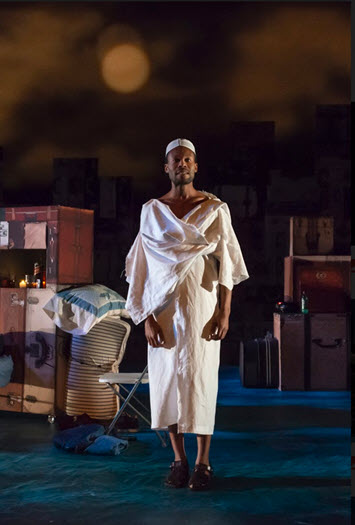 Freddie Bennett ~ Photography by CHRISTOPHER BANKS There is a spirit figure in the story, around which themes of religion, gender roles and the complexities of modern life in America and the Middle East, are hung with reverence. Abdallah is Musa’s friend, a fixer for newly arrived immigrants to the U. S. Through his business he makes enough money to fulfill his dream to travel to Mecca to join other pilgrims to make the Hajj. While there, he takes a boat that capsizes, and he is lost at sea. But Sheri sees his ghost in Musa’s apartment, and he reappears at critical moments as a man whose deep faith guides his journey.
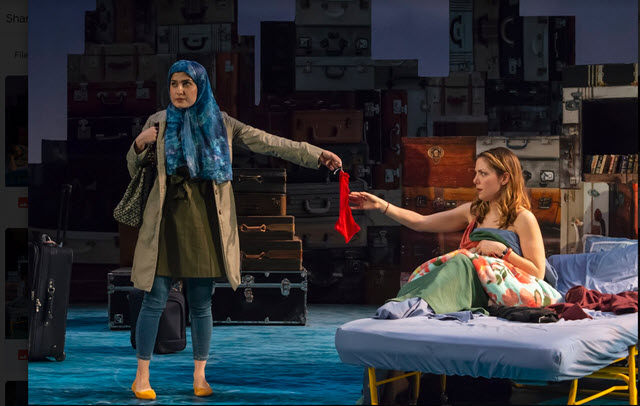 Sanam L. Hashemi and Rachel Felstein ~ Photography by CHRISTOPHER BANKS Things go sideways when Musa’s fiancée unexpectedly returns a few days early after meeting with his parents in Egypt to plan their upcoming nuptials. Entering the apartment, Gamila finds Sheri in his bed. Blindsided by the knowledge that he is engaged, Sheri freaks out and all hell breaks loose between the two women. As an educated and devout Muslim American, Gamila, is shocked to find out that Musa is shacking up with a woman and the two have it out.
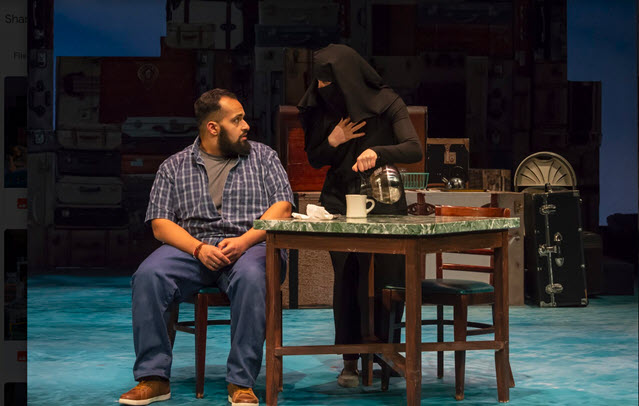 Ahmad Kamal and Rachel Felstein ~ Photography by CHRISTOPHER BANKS The crux of this dilemma is if Musa will choose Sheri or Gamila? And will either woman forgive him? “I can be who I want with her,” he tells Gamila. When she protests that he is denying his faith and her love, he tells her, “I don’t want roots, customs, traditions and family. I don’t want the rest of my life to be what I know.”
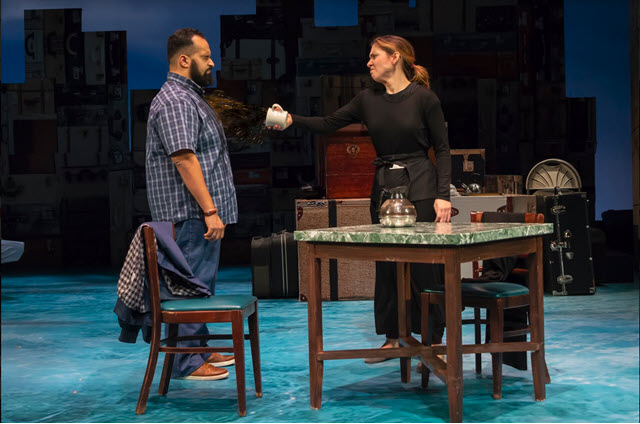 Ahmad Kamal and Rachel Felstein ~ Photography by CHRISTOPHER BANKS As the Production’s Dramaturg Salma S. Zohdi tells us, “Each character seeks pilgrimage, albeit in different ways. Both Musa and Sheri seek spiritual pilgrimage, yet Gamila seeks a homeward bound pilgrimage. A specific common thread connects all the Muslim characters’ emotional voyage, and that is overcoming the challenges of being a Muslim immigrant.”
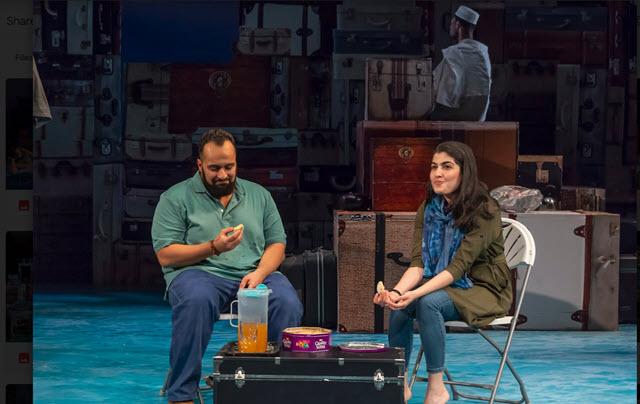 Ahmad Kamal and Sanam L. Hashemi ~ Photography by CHRISTOPHER BANKS A part of Mosaic’s “Voices from a Changing Middle East Festival”, the play is written by Yussef El Guini and directed by Shirley Serotsky. The story is a powerful and passionate glimpse into the perils of the Muslim experience in America. Like the region’s desert sands, that experience is not static, it is always shifting.
Hauntingly beautiful Egyptian music by singer Mohamed Mounir backgrounds the play.
Featuring Ahmad Kamal as Musa; Rachel Felstein as Sheri; Freddie Lee Bennett as Abdallah; Gerrad Alex Taylor as Tayyib; and Sanam Laila Hashemi as Gamila.
Set Design by Nephelie Andyonadis; Lighting Design by Brittany Shemuga; Costumes by Danielle Preston; Sound Design by Roc Lee.
Post-show discussions and talkbacks are free to the public. Visit the website for times and dates.
Through February 16th at the Atlas Performing Arts Center, 1333 H Street, NE, Washington, DC 20002. For tickets and information visit www.MosaicTheatre.org or call the box office at 202.399.7993 extension 2.
Jordan Wright
December 12, 2019
Jonathan Spector’s comedy about a private, liberal grade school in Berkeley, California brings tons of laughs when its politically correct committee of five educators is faced with an outbreak of the mumps. Among the school’s decision-makers are Meiko, a shy Asian woman in an affair with Eli who is also married; Eli, the eternal organizer, “I think this might be a good moment for a community-activated discussion.”; Carina, an African American mom new to the committee and unafraid to speak out; Suzanne, the deeply passive-aggressive head of the committee, “We have a lot of neuro-diversity here.”; and Don, a Birkenstock-sporting, flow-chart specialist subservient to Suzanne, “I am only here to facilitate,” he defers. As a group, they are a hot mess – more concerned with heritage designations on enrollment forms and gender-optional pronouns.
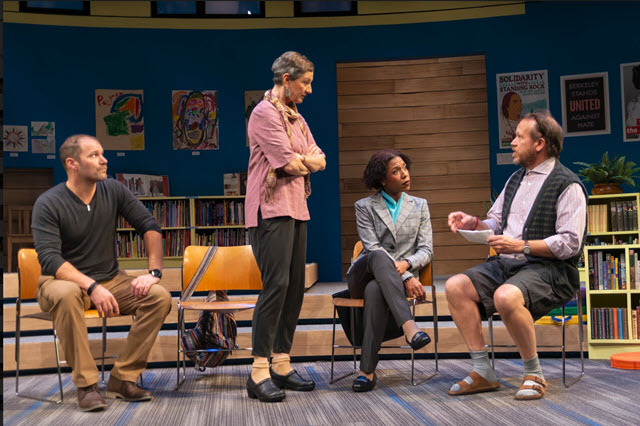 Eureka Day Ensemble – Photo credit Christopher Banks Needing universal consensus to institute an action plan, they vote to Skype in the parents. But all hell breaks loose when the parents’ divergent views devolve into a virtual live Tweet, scream-fest and medical facts become as disposable as eco-friendly bamboo plates. Yes, there’s a discussion about that too, when clueless Carina serves snacks on plastic plates.
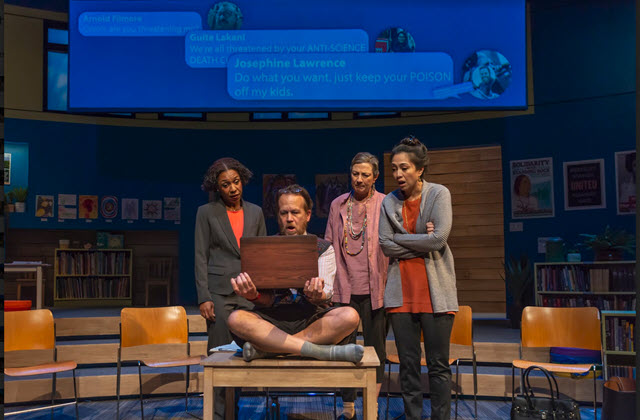 Eureka Day Ensemble – Photo Credit Christopher Banks The hot-button issue between those who believe in vaccinating their kids and the anti-vaxxers is utterly hilarious as the video-projected, live feed convos become a caustic maelstrom of name-calling, Pharma-blaming, climate change tirades, Creationism battles, and religious disagreements. No, wait. “Disagreement” is too soft a word to describe how the parents go into full-on, personal attack mode. Sound familiar? All too familiar in this issue-charged political climate. Played for laughs we can watch the turmoil from a safe distance while acknowledging how polarizing these issues have become. Artistic Director, Ari Roth, defines it as, “Progressives Behaving Badly.”
 Eureka Day Ensemble – Photo Credit Christopher Banks Not too long ago this was in the news when it was left to a court to decide. Should you protect children who are already vaccinated from attending school with those whose parents decide not to vaccinate? Do you place a quarantine on the school? For how long, and who decides? In this clever comedy, and as in real life, some don’t survive these irresponsible decisions.
Andrew Cohen’s set design is purposely innocent – a brightly-lit, colorful classroom lined bookshelves and children’s art – a perfectly neutral spot for adult mayhem especially in the hands of this wildly expressive ensemble.
 Eleanor Holmes Norton – Photo credit Christopher Banks On the night I saw it Eleanor Holmes Norton played a cameo role. More local notables are on schedule to appear during the run. Check the schedule.
Highly recommended. As soon as I left the theatre, I wanted to see it again.
Directed by Serge Seiden with Lighting Design by Brittany Shemuga; Original Projections by Teddy Hulsker; and Projections by Dylan Uremovich. Originally commissioned and produced by Aurora Theatre Company, Berkeley, CA.
With Regina Aquino as Meiko; Lise Bruneau as Suzanne; Erica Chamblee as Carina; Sam Lunay as Don; Elan Zafir as Eli; and Mar Cox/Thomas Nagata as Winter.
Through January 5th at The Atlas Center for the Performing Arts – 1333 H Street, NE, Washington, DC 20002. For tickets and information call 202 399-7993 ext. 2 or visit www.MosaicTheater.org.
Jordan Wright
August 27, 2019
Mosaic’s fifth season opens with two-time Pulitzer Prize winner Lynn Nottage’s play Fabulation Or, The Re-Education of Undine. Nottage draws from the notion of “Sankofa”, a West African concept that touches on a number of relatable themes – poverty, success, loss, love and hope. Its central premise is revisiting the past to find what has been lost, in order to connect with the future. Heady stuff that refutes the notion that you can never go home.
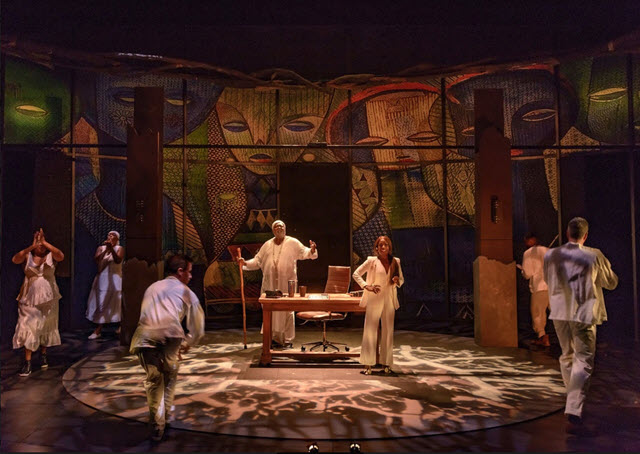 William Newman Jr and Felicia Curry – Photo credit Christopher Banks Undine Barnes is arrogant and self-assured – a veritable bitch on wheels. A queen boss who graduated Dartmouth and became a successful public relations entrepreneur. In the process she ditched her hard-working, middle-class family living in the projects in Brooklyn (she tells everyone they died in a fire) and found her niche by marrying, Hervé, a suave Argentinian with oodles of unctuous cachet. Unfortunately, the slick mountebank quickly obliterates her celebrity-centric business by running off with all her dough.
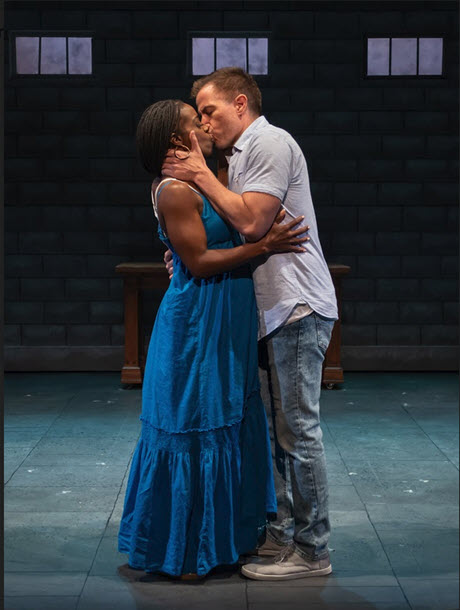 Felicia Curry and Carlos Saldaña – Photo credit Christopher Banks At 37-years old and pregnant, Undine (née Shorona) must now find a way to start over. Leaving her luxe Manhattan lifestyle, but not her bougie Vuitton handbag, she is forced to move back home. Along the way ancient spirits parade the stage with drums and ancient calls and she meets a Harvard-educated, Yoruba priest, who works for cash and booze in exchange for advice.
 Roz White, Felicia Curry, and Lauryn Simone – Photo credit Christopher Banks They all weave in and out of Undine’s misadventures as she becomes reborn. It is these ancient ceremonial interstices that ground the story and make it more profound than light comedy. Because, though it would be classified as a comedy, it is more like Alice in Wonderland crossed with Cookie Lyon of Empire and anchored by ancient African mythology.
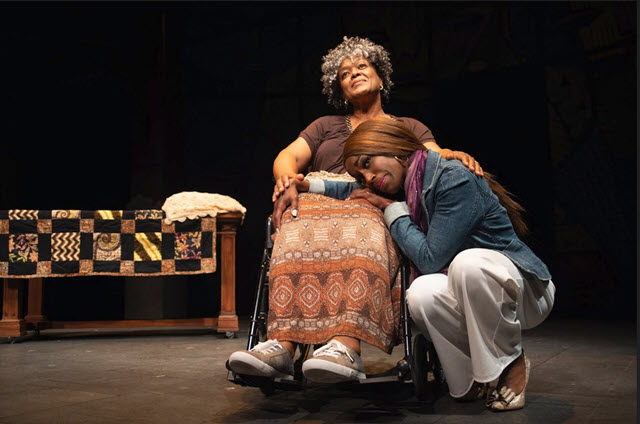 Aakhu TuahNera Freeman and Felicia Curry – Photo credit Christopher Banks Nottage crafts unforgettable characters – a heroin-addicted granny, street-smart welfare mommas, a group therapy circle of ex-junkies, and a brother whose rap poetry centers on the “double-voiced” trickster figure of B’rer Rabbit from The Tales of Uncle Remus. Thus, the “fabulation”.
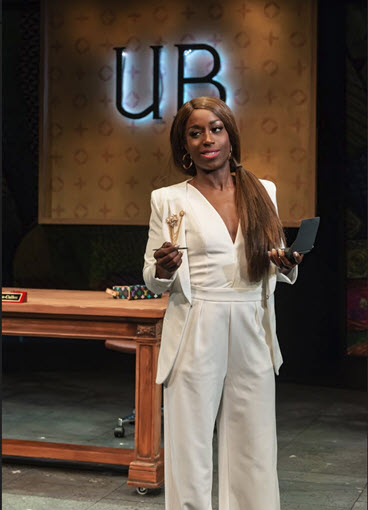 Felicia Curry – Photo credit Christopher Banks Famed actor Felicia Curry stars as Undine and she is positively incandescent. It’s a tough role to go from angry black woman on top of the world to humbled and hopeful, educated woman navigating the mean streets. But, once you see how seamlessly she handles that difficult transition, you can’t imagine any other woman in the lead. Under the expert direction of Eric Ruffin, the cast not only thrives but carves out an ensemble that meshes beautifully.
Highly recommended.
With Aakhu TuahNera Freeman as Grandma/Doctor/Inmate, William Newman Jr. as Father/Yoruba Priest, Carlos Saldaña as Hervé/Guy, Lauryn Simone as Stephie/Counselor/Devora, Kevin E. Thorne II as Flow/Agent Duva, James Whelan as Accountant Richard and Roz White as Mother/Allison/Rosa.
Assistant Director Jared Smith, Set Design by Andrew Cohen, Lighting Design by John D. Alexander, Costume Design by Moyenda Kulemeka, and Sound Design by Cresent R. Haynes.
Through September 22nd at The Atlas Center for the Performing Arts – 1333 H Street, NE, Washington, DC 20002. For tickets and information call 202 399-7993 ext. 2 or visit www.MosaicTheater.org.
Jordan Wright
June 27, 2019
Twisted Melodies, a dramatic interpretation of the last day of Donny Hathaway’s life, touches us on so many levels. As a consummate songwriter and performing artist, Hathaway was one of the most enduring talents during the height of the 1970’s R&B scene. An accomplished pianist, soul, blues and jazz singer, and collaborator with Roberta Flack (The Closer I Get To You), he borrowed from his gospel roots reinterpreting his melodic memories into one of the most recognizably appealing sounds of the decade. For area audiences it’s a special treat to experience this powerful production and revisit some of his music, as Hathaway was well known in DC circles where he attended Howard University during the Civil Rights era.
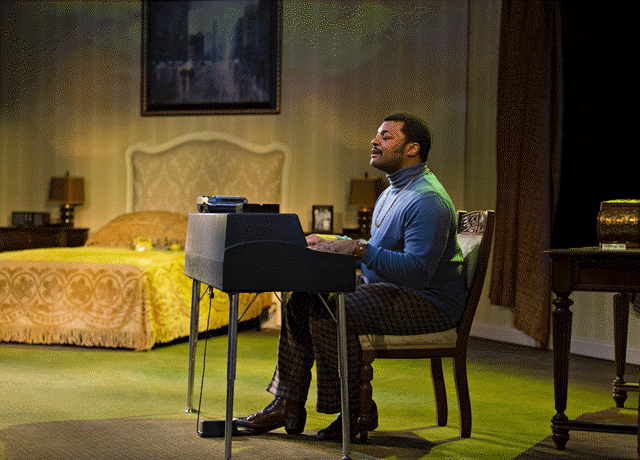 Twisted Melodies at Baltimore Center Stage, in associa- Pictured: Kelvin Roston, Jr. © Richard Anderson Making its DC premiere at Mosaic Theatre in association with New York’s famed The Apollo Theater, its writer, star, and musical director, Kelvin Roston, Jr., presents an indelible foray into Hathaway’s psychological turmoil. Roston’s skill at becoming Hathaway’s doppëlganger captures the artist in his most fragile period after he had been hospitalized several times with a diagnosis of paranoid schizophrenia and was living on a dangerous cocktail of medications that served only to increase his fears and insecurities.
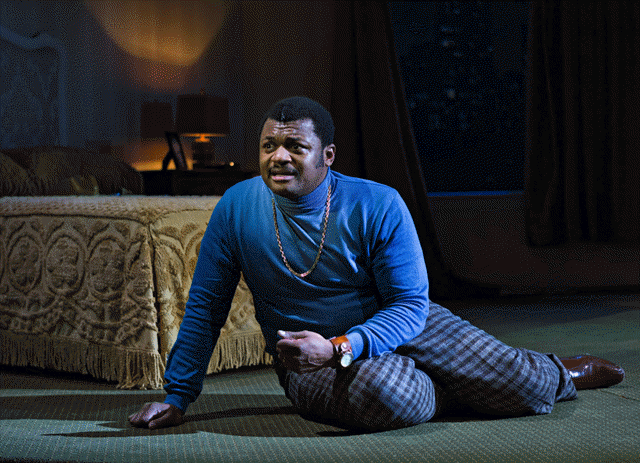 Twisted Melodies at Baltimore Center Stage, in association with Congo Square Theatre Company Pictured: Kelvin Roston, Jr. © Richard Anderson Set in a New York hotel room where Hathaway is surrounded by his demons – a ghost named Duke, disembodied voices and fears of his room being bugged – the terrified singer fights to keep it together on the eve of his comeback. “I gotta focus! Twist it into melodies. Everybody is depending on me.” Interspersed with songs by Hathaway and other artists – Leon Russell, George Clinton, Stevie Wonder – played on an electric piano, Roston dramatizes Hathaway’s decline as both an artist and father.
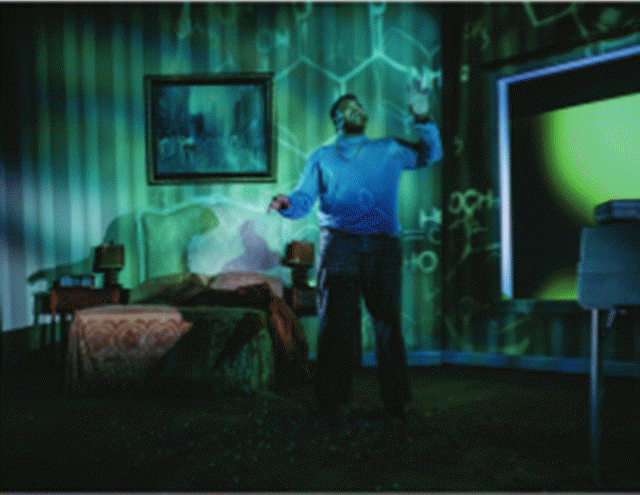 Twisted Melodies at Baltimore Center Stage, in association with Congo Square Theatre Company Pictured: Kelvin Roston, Jr. © Richard Anderson Roston’s tour de force portrayal of a tormented soul in full-blown crisis mode is skillful beyond imagining. Not only is his beautifully written script filled with passion and raw emotion, but more incredibly, he takes on Hathaway’s entire persona in what would be a physically and emotionally draining role for any actor. Along the way, he reaches out to the audience, as though we are a part of his rehabilitation. As his “angels” and “muses”, he calls out to us for support, acknowledging our presence as he strives to transform his anger and weakness into beauty.
Highly recommended.
Directed by the award-winning Derrick Sanders, Set Design by Courtney O’Neill, Costumes by Dede Ayite, Lights by Alan C. Edwards, Sound by Christopher M. LaPorte, and Projections by Mike Tutaj. Presented in co-production with Baltimore Center Stage and The Apollo Theater.
Through July 21st at the Atlas Center for the Performing Arts in the Theresa and Jane Lang Theatre – 1333 H Street, NE, Washington, DC 20002. For tickets and info on post show discussions, special rates and discounts visit www.MosaicTheater.org or call the box office at 202.399.7993 ext. 2. Valet parking at 1360 H Street, NE.
Jordan Wright
April 19, 2019
When two famous writers – one heterosexual, one homosexual, both controversial – square off in a Paris café there are bound to be fireworks. Set in the intellectual cosmos that was Paris in 1953, Les Deux Noirs is playwright Psalmayene 24’s imagined conversation between notable novelist, Richard Wright of Native Son fame, and writer and activist James Baldwin, known for his semi-autographical novel Go Tell It on the Mountain (or whatever your favorite one is).
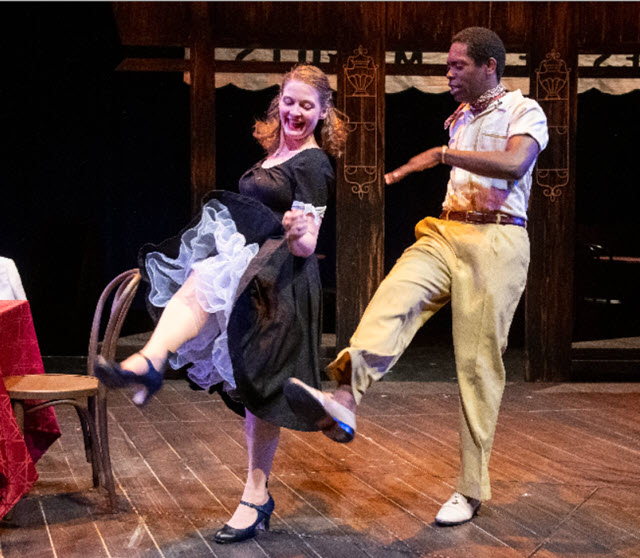 (l-r) Musa Gurnis as (Ludivine) and Jeremy Hunter as (James Baldwin) ~ Photo Stan Barough It opens with their meeting at Les Deux Magots after provocateur and enfant terrible Baldwin had written a scathing review of Native Son, calling Wright a racist. Wright demands the younger writer recant his critiques in a public forum. “You’ve insulted my legacy,” Wright rages. “Sociology is not literature,” Baldwin counters. It doesn’t go well. They verbally spar. Then it gets physical. Thrust and parry. Rinse and repeat.
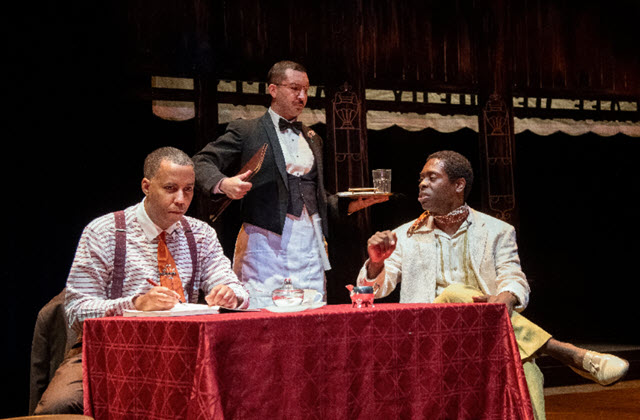 (l) James J. Johnson (Richard Wright) (c) RJ Pavel as Jean-Claude (r) Jeremy Hunter (James Baldwin) ~ Photo by Stan Barough Interwoven with rap and rhyme, Psalmayene 24 gifts us with a spellbinding interpretation of their relationship by creating imagined exchanges laced with political diatribes and withering barbs. But there are plenty of funny bits too, as when Baldwin flirts with Jean-Claude the waiter star struck by the literary luminaries who frequent the legendary café, and Wright who charms Ludivine, a pretty waitress who falls for him. For Baldwin, who is broke, it’s a chance at a free meal, though Wright refuses to pick up the tab. For Wright, it’s a chance to disparage the young upstart and redeem himself.
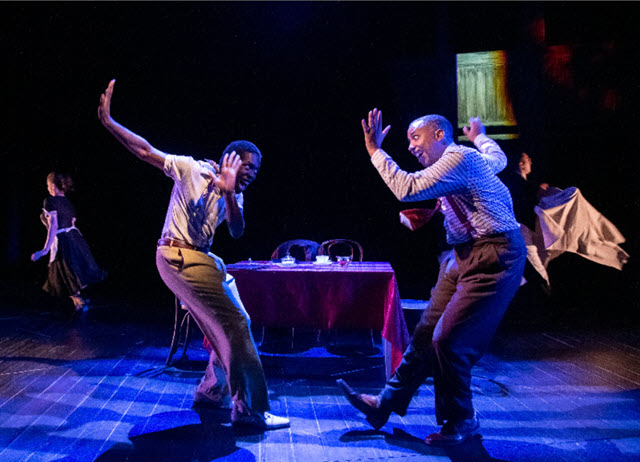 (l-r) Jeremy Hunter (James Baldwin) and James J. Johnson (Richard Wright) ~ Photo by Stan Barough Wright had his own problems. He’d come out as a Communist – it was very au courant among intellectuals of the period – and he feared his movements were being monitored. Nonetheless they both felt that by living in Paris they were safe from persecution. “Paris is freedom. America is prison.” They both agreed on that.
 (l-r) James J. Johnson (Richard Wright) and Jeremy Hunter (James Baldwin) ~ Photo by Stan Barough James J. Johnson who plays Wright and Jeremy Hunter who plays Baldwin are well-matched and prove exceptionally appealing in these challenging roles. I am more familiar with Hunter, a chameleon of a performer I recently reviewed in Top Dog/Underdog from Avant Bard, who is superb. It was mind-boggling to see him morph from a tough guy grifter to a sashaying, pinky-out, ascot-sporting intellectual. He is extraordinarily versatile.
 (l-r) James J. Johnson (Richard Wright) and Jeremy Hunter (James Baldwin) ~ Photo by Stan Barough Director Raymond O. Caldwell (Artistic Director of Theatre Alliance) finds the perfect pitch to highlight the men’s differences, ratcheting up their machismo by perching them on chairs and tabletops where they can eloquently rap out their sociological viewpoints while cruising the local talent.
With RJ Pavel as Jean-Claude and Musa Gurnis as Ludivine. Isaiah M. Wooden, Dramaturg; Amy MacDonald, Costume Design; Brandi Martin, Projections; Tiffany Quinn, Choreographer.
Electrifying, imaginative and compelling.
Originally part of Mosaic’s Season Four Workshop Reading Series, Les Deux Noirs has become a fully developed, world premiere production that is currently being performed in repertory with Native Son through April 27th at the Atlas Center for the Performing Arts 1333 H Street, NE, Washington, DC 20002. For tickets and info on post show discussions, special rates and discounts visit www.MosaicTheater.org or call the box office at 202.399.7993 ext. 2. (Parking lot at 1360 H Street, NE.)
|
























